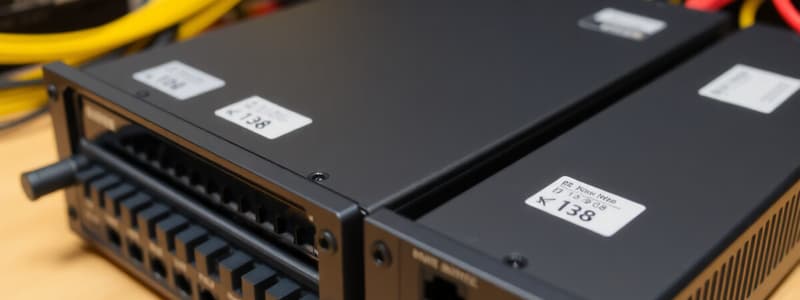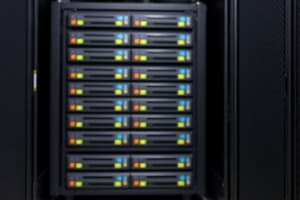Podcast
Questions and Answers
What are the three main types of storage devices covered in the lecture?
What are the three main types of storage devices covered in the lecture?
- Magnetic, Laser Beam, Electrons
- Hard Drive, Optical Discs, Flash Memory (correct)
- Internal, External, Remote
- Network Storage, Cloud Storage, Smart Cards
A hard drive can be either internal or external.
A hard drive can be either internal or external.
True (A)
What type of storage device uses laser beams to read and write data?
What type of storage device uses laser beams to read and write data?
- Hard Drive
- Flash Memory
- Magnetic Tape
- Optical Discs (correct)
What is the name given to the process of writing data onto an optical disc?
What is the name given to the process of writing data onto an optical disc?
Which of the following are examples of flash memory chips embedded into products? (Select all that apply)
Which of the following are examples of flash memory chips embedded into products? (Select all that apply)
A flash memory card can only be written to, not read from.
A flash memory card can only be written to, not read from.
What is the main difference between a hard drive and a Solid-State Drive (SSD)?
What is the main difference between a hard drive and a Solid-State Drive (SSD)?
Which of the following are types of embedded computers? (Select all that apply)
Which of the following are types of embedded computers? (Select all that apply)
A laptop is a type of mobile computer.
A laptop is a type of mobile computer.
Which of the following factors affect computer performance? (Select all that apply)
Which of the following factors affect computer performance? (Select all that apply)
The faster the CPU speed, the slower the computer will run.
The faster the CPU speed, the slower the computer will run.
What is the unit of measurement for RAM size?
What is the unit of measurement for RAM size?
Swap files are used to simulate extra memory on a computer.
Swap files are used to simulate extra memory on a computer.
What is the name of the computer category that is the most powerful and expensive?
What is the name of the computer category that is the most powerful and expensive?
Flashcards
Output Devices
Output Devices
Devices that display or present information to the user.
Display Devices
Display Devices
Output devices that show visual information, like monitors and screens.
Touch Screen
Touch Screen
A display that acts as both input and output.
Wearable Displays
Wearable Displays
Signup and view all the flashcards
LCD
LCD
Signup and view all the flashcards
LED Displays
LED Displays
Signup and view all the flashcards
Projection Devices
Projection Devices
Signup and view all the flashcards
Printers
Printers
Signup and view all the flashcards
Impact Printers
Impact Printers
Signup and view all the flashcards
Ink-Jet Printers
Ink-Jet Printers
Signup and view all the flashcards
Laser Printers
Laser Printers
Signup and view all the flashcards
Special Purpose Printers
Special Purpose Printers
Signup and view all the flashcards
Speakers & Headphones
Speakers & Headphones
Signup and view all the flashcards
Storage Devices
Storage Devices
Signup and view all the flashcards
Storage Medium
Storage Medium
Signup and view all the flashcards
Hard Drive
Hard Drive
Signup and view all the flashcards
Optical Discs
Optical Discs
Signup and view all the flashcards
Flash Memory
Flash Memory
Signup and view all the flashcards
Network Storage
Network Storage
Signup and view all the flashcards
Cloud Storage
Cloud Storage
Signup and view all the flashcards
Smart Cards
Smart Cards
Signup and view all the flashcards
Magnetic Storage
Magnetic Storage
Signup and view all the flashcards
Laser Storage
Laser Storage
Signup and view all the flashcards
Electronic Storage
Electronic Storage
Signup and view all the flashcards
Internal Hard Drive
Internal Hard Drive
Signup and view all the flashcards
External Hard Drive
External Hard Drive
Signup and view all the flashcards
Read-Only Optical Disc
Read-Only Optical Disc
Signup and view all the flashcards
Recordable Optical Disc
Recordable Optical Disc
Signup and view all the flashcards
Rewritable Optical Disc
Rewritable Optical Disc
Signup and view all the flashcards
Study Notes
Course Information
- Course Title: Computer Skills & Programming Concepts I
- Course Codes: UEC01, PCD104, PCC104, HGCP101
- Lectures: 1-6
- Course Coordinator: Assoc. Prof. Mohamed Ismail Badawi
- Instructors: Mohamed Ahmed Taha, Maher Habashy, Angy Saleh, Yasser Abd El Aziz, Reham Refaat, Nehal Essam
Lecture 6 - Output Devices
- Topic: Output Devices
- Lecture Number: 6
- Key Concepts: Includes output devices like:
- Display Devices (Monitors, Touch Screens, Wearable Displays, Touch & Gesture, Mobile Devices, Liquid Crystal Displays (LCDs), Light Emitting Diode (LED) Displays, Projection Devices)
- Printers (Impact Printers (Dot Matrix), Non-Impact Printers, Ink-Jet Printers, Laser Printers, Special Purpose Printers (Barcode, Label, Postage, Photo, 3D))
- Speakers and Headphones
Storage Systems
- Topic: Storage Systems
- Types:
- Hard Drive
- Optical Discs
- Flash Memory
- Network Storage
- Cloud Storage
- Smart Cards
- Magnetic Tape
- Characteristics:
- Storage medium is hardware where data is stored and typically identified by a capital letter (e.g., C:, D:).
- Storage can be internal, external, or remote.
- Storage media are non-volatile.
- Storage technologies: Magnetic (hard drives), Laser beam (optical discs), Electrons (flash memory).
Storage System Characteristics
- A storage system consists of a storage device and a storage medium.
- Storage medium is the hardware where data is stored (e.g., DVD, flash memory card).
- Storage devices typically are identified by a capital letter (e.g., C, D).
- Storage can be internal, external, or remote.
- Storage media are non-volatile.
Hard Drives
- Used to store programs and data.
- Can be encrypted.
- External hard drives are used for transporting data.
- Internal hard drives are permanent storage.
Optical Discs
- Data stored optically using laser beams.
- Used for backups, storing and transporting music, photos, video, etc.
- Recording data is called burning.
- Read-only discs (e.g., CD-ROM, DVD-ROM, BD-ROM)
- Recordable discs (e.g., CD-R, DVD-R, DVD+R, BD-R)
- Rewritable discs (e.g., CD-RW, DVD-RW, DVD+RW, BD-RE)
Optical Disc Capacity
- Different disc types (CD, DVD, BD) have varying capacities (e.g., CD-700 MB, DVD - 4.7 GB, BDXL 128 GB).
Flash Memory Storage Systems
- Chip-based storage medium using electrons.
- Used in Solid State Drives (SSDs) and hybrid hard drives.
- Embedded in many devices (portable media players, cameras, phones, sunglasses).
- Flash memory cards and USB flash drives are common portable storage.
Computer Categories
- Computers classified by size, speed, cost, portability, simultaneous users, and typical use.
- Embedded computers - performed specific tasks within a product.
- Mobile computers - small devices powered by batteries(Laptops, Tablets, PDAs, Mobile phones).
- Microcomputers - personal computers (desktops, towers, all-in-one)
- Minicomputers - medium-sized computers used to host programs and data for a small network
- Mainframe computers - large, expensive multi-user computers for large organizations.
- Supercomputers - the fastest and most powerful computers, used for complex tasks. (satellites, weather, oil exploration, and scientific research)
Factors Affecting Computer Performance
- CPU speed (how fast the computer runs) measured in MHz or GHz; number of cores, bus speed, and cache size.
- Storage capacity (RAM) measured in MBs or GBs and speed is measured in nanoseconds (NS).
- Hard disk storage is measured in Gbytes and speed in milliseconds (MS). Swap files on the hard drive are used to simulate more/faster RAM.
Studying That Suits You
Use AI to generate personalized quizzes and flashcards to suit your learning preferences.
Related Documents
Description
This quiz covers Lecture 6 of the Computer Skills & Programming Concepts I course, focusing on output devices and storage systems. Topics include various display devices, printers, and types of storage systems, ranging from hard drives to cloud storage solutions. Test your understanding and preparation of these essential computer components.




